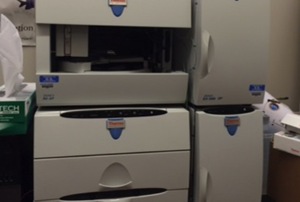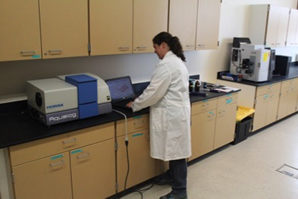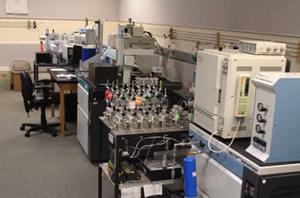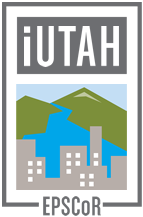Analytical Facilities
iUTAH EPSCoR established three core analytical facilities during the project to assist researchers in the processing of wet chemistry samples at Utah State University, biogeochemical analytical capacity at the University of Utah, and a stable isotope ratio facility at the University of Utah. These facilities offered quantitative and qualitative analyses, and enjoyed a successful track record of achievements through service, collaborations, and interdisciplinary interactions.
Aquatic Biogeochemistry Laboratory

The Aquatic Biogeochemistry Lab, located at Utah State University, is an existing analytical facility that was expanded with support from iUTAH. This recharge facility has analytical equipment for processing wet chemistry samples including a dual-channel Dionex ion chromatograph with gradient pump, autosampler and computer data acquisition for analysis of low-concentration anions and cations in water; a Shimadzu TOC-V analyser for analysis of dissolved organic carbon and total nitrogen in water; an Astoria-Pacific autoanalyzer with five cartridges capable of simultaneous analysis of TN, TP, SRP, NO3, and NH4; a field/lab SRI gas chromatograph with ECD/FID/TCD for N2O, SF6, CH4, CO2 measurement; a Turner Aquafluor mini fluorometer with capability to measure NH4 and chlorophyll-a; a Horiba Aqualog scanning spectrofluorometer; and a UV-Vis spectrophotometer.
Biogeochemistry of Urban Green Infrastructure (BUGI)

This analytical facility parallels instrumentation available at USU and BYU and was funded as part of the Utah EPSCoR track 1 award in order to provide biogeochemical analytical capacity at distributed urban sites and the GIRF bioretention systems. Instrumentation includes an ion chromatograph (Metrohm) for analysis of anions and cations, a Horiba Aqualog scanning spectrofluorometer, a gas chromatograph with TCD/ECD/FID, and a flow segmented analyzer for nutrient analysis.
Stable Isotope Ratio Facility for Environmental Research (SIRFER)

SIRFER is a 25-yr+ interdisciplinary research and teaching recharge facility under the direction of Distinguished Professor Jim Ehleringer in the Department of Biology, at the University of Utah. This recharge facility operates eight stable isotope ratio mass spectrometers (ThermoFinnigan) for the purpose of natural abundance measurements of H, C, N, O, and S stable isotopes in organic and inorganic matter, including solids, liquids, and gases. Major peripherals include a laser based micro-carbonate system; automated trace gas analysis of concentration and isotopes in a multi-flask analysis capacity; gas bench for head space and carbonate analyses; EA-, GCC-, and GC/TC/EA-CF-IRMS; and offline GCMS capacity. A major SIRFER focus is providing an open environment for research, teaching, and outreach for scientists from on-campus, off campus at other universities, and from governmental agencies. Undergraduate- and graduate-level classes and research opportunities are offered. SIRFER offers annual Stable Isotope Ecology Lecture and Laboratory courses that attract 35 students per year from across the USA and around the world. These courses are taught by 15 instructors from across the USA.


